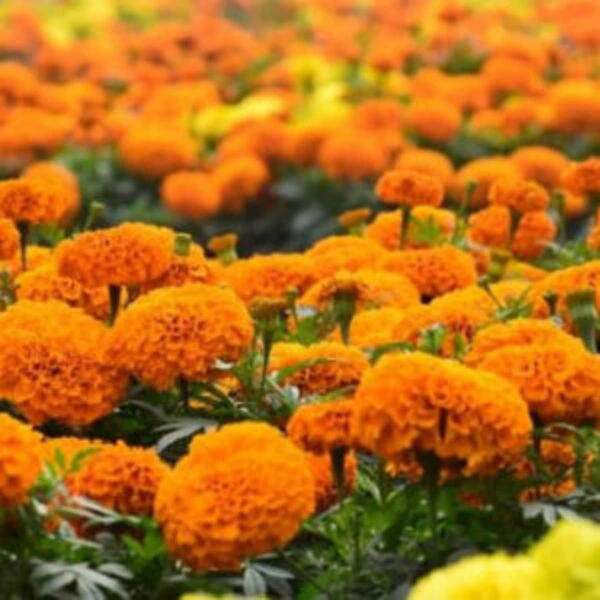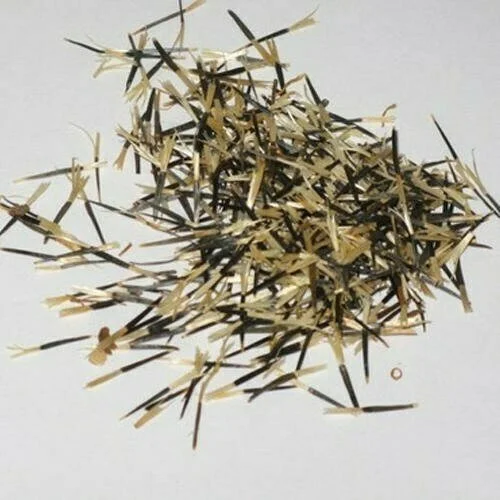French Orange Marigold Seeds (10 seeds)
₹20.0
We love the loose, airy feeling of this Orange Marigold having an eye-catching color. Germination is quick which adds the advantage of becoming an easy flower to grow for newbies and kids. Try our Non-GMO French Orange Marigold Seeds. Also, check out our workshops for more details.
PRODUCT DESCRIPTION
Number of seeds in a packet – 10
PLANT DESCRIPTION
- Difficulty Level – easy
- Plant Height – 6 – 18 inches
- Flower Color – orange
- Type – indoor (balcony/terrace)
- Feed – Vermicompost for nutrients every week, Seaweed once a month for greener leaves, and Epsom salt for better blooming once a month
- Watering – alternate days
- Sunlight – full sunlight
- Germination Time – 1 week
- Flowering Time – 8 weeks
- Suitable Temperature – 60°F – 70°F
- Season – annual
- Sowing – preferably in september
HOW TO GROW FRENCH ORANGE MARIGOLD FROM SEEDS
- Take a Seedling Tray and fill it with Cocopeat.
- Make ½ inch deep hole and put 4 seeds in each hole.
- Fill the hole with Cocopeat and spray with water using a spray gun or spray bottle.
- Water on alternate days.
- Seeds will germinate within a week.
- Full sunlight is needed.
ALTERNATE METHOD
- Take a Medium Size Pot and add a good Potting Mix.
- If planting in the soil add Neem Cake Powder, Vermicompost, and Seaweed.
ALTERNATE NAME
Botanical name: Tagetes patula
french orange marigold seed in hindi: phrench naarangee genda beej (फ्रेंच नारंगी गेंदा बीज)
french orange marigold seed in kannada: phrennc kittaḷe marigold bija (ಫ್ರೆಂಚ್ ಕಿತ್ತಳೆ ಮಾರಿಗೋಲ್ಡ್ ಬೀಜ)
french orange marigold seed in tamil: pirancu arancu camanti vitai (பிரஞ்சு ஆரஞ்சு சாமந்தி விதை)
french orange marigold seed in telugu: phrennc narinnja banti puvvu sid (ఫ్రెంచ్ నారింజ బంతి పువ్వు సీడ్)
french orange marigold seed in marathi: phreenca santra jhendu biyane (फ्रेंच संत्रा झेंडू बियाणे)
french orange marigold seed in malayalam: franju oranju jamanthi vithu (ഫ്രഞ്ച് ഓറഞ്ച് ജമന്തി വിത്ത്)
You must be logged in to post a review.
Q & A
The sustainability of organic flower seeds depends on several factors. Organic flower seeds are typically grown without the use of synthetic fertilizers, pesticides, or genetically modified organisms (GMOs). Here are some aspects to consider regarding their sustainability:
Environmental Impact: Organic farming practices prioritize environmental conservation. By avoiding synthetic chemicals and GMOs, organic flower seed production aims to reduce pollution, protect biodiversity, and promote soil health.
Soil Fertility: Organic flower seeds are often grown in soil enriched with organic matter, such as compost or manure. This practice enhances soil fertility, promotes beneficial microorganisms, and contributes to long-term sustainability by maintaining soil health and productivity.
Genetic Diversity: Organic flower seed production often emphasizes maintaining genetic diversity. By avoiding genetically modified seeds, organic farmers help preserve traditional and heirloom varieties, which can enhance biodiversity and resilience in agricultural systems.
Pesticide Reduction: Organic flower seeds are produced without the use of synthetic pesticides. This approach reduces chemical residues, minimizes harm to beneficial insects, and helps support the ecosystem services provided by pollinators.
Seed Sovereignty: Organic flower seeds encourage seed sovereignty by promoting farmers' ability to save, exchange, and reproduce their seeds. This practice empowers farmers, reduces dependence on seed companies, and supports local seed systems.
Certification and Standards: Organic flower seeds are often regulated by certification bodies that enforce specific standards. These standards ensure that the seeds are produced following organic practices, which adds transparency and accountability to the process.
However, it's essential to note that the sustainability of organic flower seeds can vary depending on the specific farming practices, certification systems, and regional contexts. It's important to support reputable organic seed producers and research the specific methods and principles they follow. Additionally, considering the overall sustainability of your gardening practices, such as water use, companion planting, and responsible waste management, will further contribute to a sustainable flower-growing system.
General Inquiries
There are no inquiries yet.


















Reviews
There are no reviews yet.